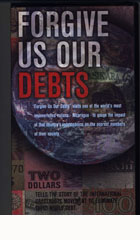
Forgive Us Our Debts 2001
Distributed by Bullfrog Films, PO Box 149, Oley, PA 19547; 800-543-FROG (3764)
Produced by Windborne Productions
Directed by Karen Pascal
VHS, color, 50 min.
Sr. High - Adult
Economics
Date Entered: 02/10/2005
Reviewed by Michael J. Coffta, Business Librarian, Bloomsburg University of PennsylvaniaThis cogent film petitions its viewers to employ an “ethical imagination” when contemplating globalization. Though economic globalization keys in on bringing down boundaries, this documentary critically examines social and environmental impacts of the global economy and examines several organizations who advocate a “think globally, act globally” stance on the issue of forgiveness or diminution of debts of developing economies, such as Nicaragua. The audience is given many examples of ways in which the gap between the “haves” and “have nots” is widening.
This film does a superb job of demonstrating the cycle of indebtedness on the part of developing economies. While many countries’ debt burdens can be ascribed to natural disasters, many countries’ leaders made foolish national investments forcing the countries to borrow abroad. The countries’ incomes can barely cover interest payments, so there is little financial support for education and healthcare. The only way to inject new money into their economies is by export, which fosters sweatshops and de facto slavery.
Though the vast majority of the film discusses the rationale for debt forgiveness, the film presents a brief section on its disadvantages. Some argue that foreign aid in the form of food and medicine targets specific needs while money may be squandered and only add to the cycle of debt. The film offers extensive footage and interviews with decision makers and stakeholders in this dire issue. The presentation of information is serious yet lively. Input is provided from a wide array of personalities from Pope John Paul II to Archbishop Desmond Tutu to Bono. This film is highly recommended due to its sound organization and deep examination of the issue. It is most appropriate for audiences high school age and higher.